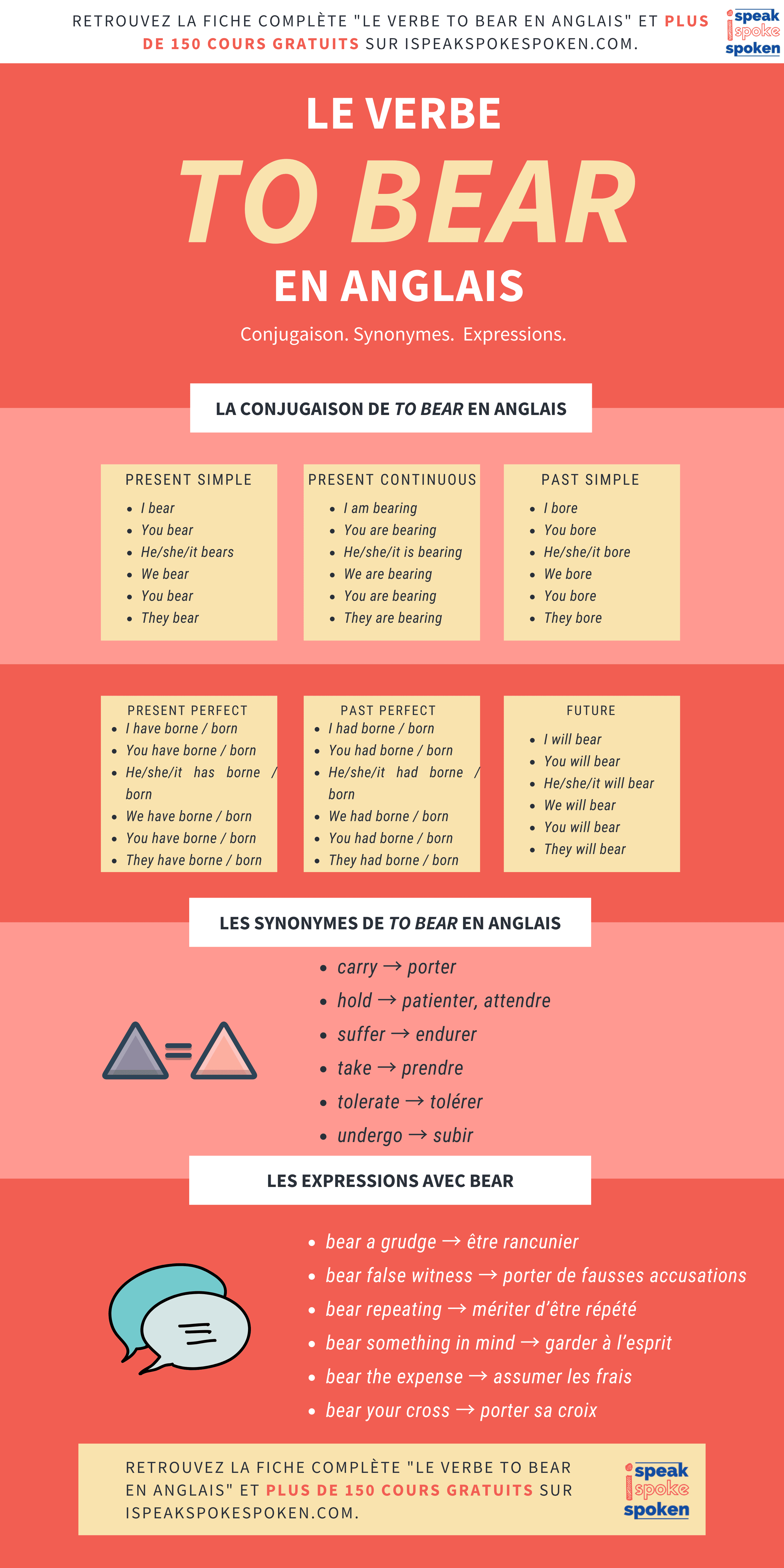Temps, modes : nous allons vous détailler la conjugaison de bear en anglais, et vous donner sa définition, ses phrasal verbs, ses synonymes, et les expressions construites autour de ce verbe.
Tableaux de conjugaison de bear en anglais
Conjugaison du verbe bear à l’indicatif
Le verbe bear au present simple
- I bear
- You bear
- He/she/it bears
- We bear
- You bear
- They bear
Le verbe bear au present continuous
- I am bearing
- You are bearing
- He/she/it is bearing
- We are bearing
- You are bearing
- They are bearing
Le verbe bear past simple
- I bore
- You bore
- He/she/it bore
- We bore
- You bore
- They bore
Le verbe bear au past continuous
- I was bearing
- You were bearing
- He/she/it was bearing
- We were bearing
- You were bearing
- They were bearing
Le verbe bear au present perfect
- I have borne / born
- You have borne / born
- He/she/it has borne / born
- We have borne / born
- You have borne / born
- They have borne / born
Le verbe bear au present perfect continuous
- I have been bearing
- You have been bearing
- He/she/it has been bearing
- We have been bearing
- You have been bearing
- They have been bearing
Le verbe bear au past perfect
- I had borne / born
- You had borne / born
- He/she/it had borne / born
- We had borne / born
- You had borne / born
- They had borne / born
Le verbe bear au past perfect continuous
- I had been bearing
- You had been bearing
- He/she/it had been bearing
- We had been bearing
- You had been bearing
- They had been bearing
Le verbe bear au future
- I will bear
- You will bear
- He/she/it will bear
- We will bear
- You will bear
- They will bear
Le verbe bear au future continuous
- I will be bearing
- You will be bearing
- He/she/it will be bearing
- We will be bearing
- You will be bearing
- They will be bearing
Le verbe bear au future perfect
- I will have borne / born
- You will have borne / born
- He/she/it will have borne / born
- We will have borne / born
- You will have borne / born
- They will have borne / born
Le verbe bear au future perfect continuous
- I will have been bearing
- You will have been bearing
- He/she/it will have been bearing
- We will have been bearing
- You will have been bearing
- They will have been bearing
Conjugaison du verbe bear au conditionnel
Le verbe bear au conditional present
- I would bear
- You would bear
- He/she/it would bear
- We would bear
- You would bear
- They would bear
Le verbe bear au conditional present continuous
- I would be bearing
- You would be bearing
- He/she/it would be bearing
- We would be bearing
- You would be bearing
- They would be bearing
Le verbe bear au conditional perfect
- I would have borne / born
- You would have borne / born
- He/she/it would have borne / born
- We would have borne / born
- You would have borne / born
- They would have borne / born
Le verbe bear au conditional perfect continuous
- I would have been bearing
- You would have been bearing
- He/she/it would have been bearing
- We would have been bearing
- You would have been bearing
- They would have been bearing
Les autres formes
L’infinitif de bear
- to bear
Participe présent de bear
- bearing
Participe passé de bear
- borne / born
L’impératif de bear
- bear
- let’s bear
Note : to bear est un verbe irrégulier. Découvrez la liste des verbes irréguliers anglais.
Définition de bear en anglais
Que veut dire le verbe bear en anglais ?
Le Cambridge Dictionary donne plusieurs définitions du verbe bear.
Penchons-nous sur les principales :
1. To accept, tolerate, or endure something, especially something unpleasant
She can’t bear to see her child cry. → Elle ne supporte pas de voir son enfant pleurer.
2. To have or continue to have something
The label bears all the information that the consumer needs to know. → L’étiquette contient toutes les informations que le consommateur doit connaitre.
3. To hold or support something
This bridge can bear up to 800 people at the same time. → Ce pont peut supporter jusqu’à 800 personne à la fois.
4. To give birth to young, or (of a tree or plant) to give or produce fruit or flowers
These trees bear fruit every year. → Ces arbres donnent des fruits chaque année.
5. To carry and move something to a place
The horse bore him to the next village. → Le cheval l’emmena au prochain village.
Pour accéder à l’intégralité de la page du Cambridge Dictionary, cliquez ici !
Les phrasal verbs avec bear en anglais
Rappel : les phrasal verbs (ou “verbes à particule”) sont des verbes qui, lorsqu’ils sont suivis d’un autre mot (la particule), voient leur sens initial complété ou modifié.
Il existe deux phrasal verbs formés sur le verbe bear :
- bear down on → appuyer avec force sur quelque chose
- bear on → avoir un rapport avec quelque chose
- bear something out → confirmer, corroborer quelque chose
- bear up → tenir le coup
- bear upon → concerner
- bear with → patienter
Les synonymes de bear en anglais
En fonction du contexte, vous pouvez remplacer le verbe to bear par l’un des verbes suivants :
- carry → porter
- deliver → accoucher
- engender → engendrer
- hold → patienter, attendre
- suffer → endurer
- take → prendre
- tolerate → tolérer
- undergo → subir
Expressions avec bear en anglais
- bear a grudge → être rancunier
- bear false witness → porter de fausses accusations
- bear fruit → porter ses fruits
- bear repeating → mériter d’être répété
- bear something in mind → garder à l’esprit
- bear the brunt of something → faire les frais de quelque chose
- bear the expense → assumer les frais
- bear your cross → porter sa croix
- grin and bear it → serrer les dents, prendre sur soi
À l’instar de write, speak, meet, keep et eat, to bear est aussi un verbe irrégulier. Vous devez donc particulièrement faire attention aux terminaisons du passé.


